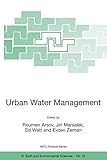Urban water management : science technology and service delivery [Libro electrónico] / editors: Roumen Arsov, Jiri Marsalek, Ed Watt and Evzen Zeman
Arsov, Roumen [editor] | Marsalek, Jiri [editor] | Watt, Ed [editor] | Zeman, Evzen [editor].
Tipo de material: Libro
en línea Series Editor: Dordrecht: Springer, c2003Descripción: xvii, 330 páginas : ilustraciones, mapas ; centímetros.ISBN: 1402015402; 9781402015403; 9789401000574 (Online).Nota de acceso: Disponible para usuarios de ECOSUR con su clave de acceso Nota de bibliografía: Incluye bibliografía e índice: páginas 329-330 Número de sistema: 56943Resumen:
Libro
en línea Series Editor: Dordrecht: Springer, c2003Descripción: xvii, 330 páginas : ilustraciones, mapas ; centímetros.ISBN: 1402015402; 9781402015403; 9789401000574 (Online).Nota de acceso: Disponible para usuarios de ECOSUR con su clave de acceso Nota de bibliografía: Incluye bibliografía e índice: páginas 329-330 Número de sistema: 56943Resumen:| Tipo de ítem | Biblioteca actual | Colección | Signatura | Estado | Fecha de vencimiento | Código de barras |
|---|---|---|---|---|---|---|
| Libros | Biblioteca Electrónica Recursos en línea (RE) | Acervo General | Recurso digital | ECO400569438830 |
Incluye bibliografía e índice: páginas 329-330
Disponible para usuarios de ECOSUR con su clave de acceso
Urban population growth dramatically alters material and energy fluxes in the affected areas, with concomitant changes in landscape, altered fluxes of water, sediment, chemicals and pathogens and increased releases of waste heat. These changes then impact on urban ecosystems, including water resources and result in their degradation. Such circumstances make the provision of water services to urban populations even more challenging. Changing weather patterns, rising temperature and large variations in precipitation contr- ute to increased damages, caused by weather related disasters, including floods. Ones of the major contributors to increasing flood peaks are land use changes and particularl- urban development. Consequently, there is a need to look for low environmental impact land development and to manage runoff in urban areas by storm water management. Much progress in the management of urban waters has been achieved in the most - vanced jurisdictions, but much more remains to be done. In this respect the EC Water Framework Directive can provide some guidance. Urban water management issues are particularly important in the countries in transition in Central and Eastern Europe. During the last decade political, economical and social changes in the countries under transition have influenced almost every element of the public sector, including water services. There is an urgent need for exchange of information among various countries on this issue and for identification of best approaches to achieving this transition. eng
Disponible en línea
Disponible en formato PDF
Subscripción a ELSEVIER 26 de diciembre del 2013
